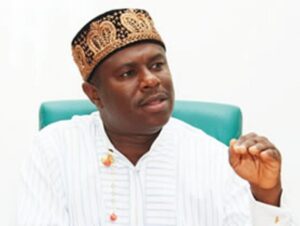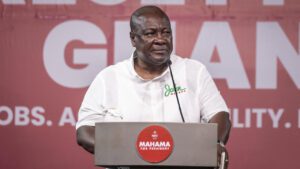
Road to anarchy: ASUU, labour, solidarity protest
By Dakuku Peterside .
Barring any last-minute change of mind, Nigeria Labour Congress (NLC) will, this week, embark on a nationwide protest in solidarity with the Academic Staff Union of Universities (ASUU) which has been on strike for more than six months forcing students to stay at home endlessly. The planned protest by the mother of all labour unions is to put pressure on the government to resolve ASUU demands to enable our students return to school.
At face value, this is a sensible thing to do. The intended consequences seem noble, but we all know that the road to hell is paved with good intentions. Often, no one can control the outcome of events like this, and it easily dovetails into mayhem and anarchy. No matter the claim by NLC that it will control the protest and not allow it to be hijacked by hoodlums and miscreants, it is evident that it does not have what it takes to exercise such control, especially given the current socio- political and economic climate that Nigeria is facing.
As a lover of democracy, I often support the democratic right of citizens to peaceful protest and any means of lawfully compelling the government to pay attention to issues of public interest and importance, and in this instance , education . However, in this case, I advise caution. These times and seasons are not conducive for such disruptive mass action because of the unintended consequences.
First, this is an election season, and politicians love manipulating circumstances to achieve ignoble advantages. Any protest now may be hijacked by politicians to score cheap and needless political points.. Oftentimes, issues unrelated to the primary reason for the protest in the first place may take centre stage. A protest by NLC may be used as a platform to cause insurrection and attempt to destabilise the polity and cause confusion everywhere.
Second, this planned protest is coming at a time of dire economic straits, with inflation hitting the roof tops, cost of diesel and petrol beyond the reach of many, collapsing social services, and
foreign exchange scarcity. The implication is that the average Nigerian is under economic pressure, feels angry and frustrated . Mass action could add to the economic pressure families face and provide building block for unanticipated effect .And third, the Nigerian social milieu of heightened uncertainty and insecurity is not a conducive ecosystem for volatile protests and possible demonstrations because of the propensity for people to circumvent it for perverse objectives.
Besides, there is sufficient evidence that when labour union protests are not managed properly to achieve the desired objective, it could spiral off to violence that can lead to radical change or anarchy. These were the cases in Italy (1920), Venezuela ( 1997), Lebanon (2020) and most recently, Sri Lanka (2022). In all these cases, situations such as the collapse of the currency, soaring inflation, and spiralling unemployment provided the fertile ground for protests by labour movements. These protests became the catalyst for unprecedented controversy and public disorder with severe national consequences in all cases. These exact situations are prevalent in Nigeria today and are getting worse by the day. These situations may provide the fuel to burn the country down, and the NLC planned protest might offer the fire for the inferno that may consume our social and political space.
Whereas NLC intention to use the protest to draw all parties attention to the prolonged strike is germane , I have a patriotic duty to call on labour to reconsider the plan for this protest at this inauspicious moment. NLC must look at the big picture and act in the national interest. It behoves NLC to know that it will be directly and precariously liable if the protest leads to anarchy. There are better ways to show solidarity with ASUU to achieve a better result than just protesting. NLC must liaise with ASUU and mediate between it and the government on this issue, considering the historical antecedents behind this crisis.
ASUU has been on strike for over six months, and there seems to be no end in sight of the action. ASUU is demanding that the government fulfils the agreement it entered into in the past, increase lecturers’ salaries and provide better funding for higher education in Nigeria. These demands aim to improve the quality of education and quality of living of university lecturers. These are legitimate demands, however one looks at it.
Historically, ASUU is synonymous with strike actions in Nigeria, and for decades they have been making demands, entering into agreements with the government which the government reneges on frequently leading to industrial actions. This has been a recurring decimal in our higher institutions for over four decades, and it has defied all governments and does not seem to be exacerbating soon. ASUU -government brouhaha is endangering the future of our youths, who either have their education truncated with the concomitant effect of producing half-baked graduates or the students spending more time than necessary to complete their degrees.
Everyone becomes a loser in this disagreement, and the nation suffers. In this disagreement, it is crucial that ASUU comes to the table with an open mind, ready to take any cause of action that will make all parties winners in the pursuit for quality education .
ASUU must see the reality of our economic circumstances the government is struggling to pay salaries, and we literarily borrow to finance government activities. Our revenue to debt service ratio has moved from 95 per cent to 116 per cent. The implication is that all our income is not enough to service our debt. Crude oil theft has reached an embarrassing crescendo, and the government is spending billions of dollars yearly to fight insurgency, bandits, terrorists, and secessionists all over the country. The global crisis post-COVID 19 pandemic and the debilitating effects of the Russian – Ukraine war have created energy and food crises worldwide. There is also the counter narrative that a government that spends about N42 b illion yearly to maintain the several aircrafts in the presidential fleet , spends 70 percent of its budget on recurrent expenditure and allows wastage in the management of the economy cannot i n good conscience say it cannot not fund education . I can rightly paraphrase John F Kennedy to put this in proper perspective , “ if the pursuit of learning is not defended by the educated citizens ( leaders), it will not be defended by all.”
ASUU , as a body of researchers , must come to the table with a bouquet of innovative ideas on university funding that will rely less on government, student fees payment models, university-industry alliances, private sector-driven convergence and university entrepreneurship to boost the funding of our tertiary institutions. There have been calls for complete university autonomy to create a competitive university education market that may provide the funds for quality education. ASUU can advocate for a joint government and university student loan arrangement that may give a lasting solution to Nigeria’s university funding issues. Academics are great researchers, and I firmly believe that it behoves on them to come up with the best formula for solving university funding crises that will permanently eliminate ASUU strikes.
The government, on the other hand, must show more seriousness and sincerity in negotiation with ASUU. Nigerians are fed up with the macabre dance, and many feel that government must do more to break the impasse. Government expenditure profile does not reflect the fact that it prioritises education and by extension the future of Nigerian youths. All sides in this dispute must be ready to shift positions based on current realities. They must find a win-win solution to resolve ASUU-government logjam as quickly as possible. It will be shameful if our students lose one academic year due to this strike. The government should remember that governance is a continuum and must not enter into agreements that it does not have any intentions of keeping immediately or in the future.
The government must work with ASUU to devise a lasting solution to the problems. It is unacceptable and irresponsible for government to enter into agreements only to renege on them . The government should study how universities are funded and how academics are rewarded in other countries and learn from that. Lecturers are bona fide members of the community and spend and buy things from the same markets as others. They are entitled to a living wage and all the perks of their office. ASUU and the government must draw a line on this issue and do a quid pro quo that is mutually beneficial.
Now is the time for all stakeholders in the education sector to rally round to save our higher education sector from collapse. We must solve the problem of strike actions once and for all if we use this opportunity to be creatively innovative in dealing with university funding. The world is moving fast, and it seems we are getting left behind. Instead of discussing the ASUU strike, we should look at how to develop the quality of our higher education to international standards.
We must develop our universities to compete locally and globally. It is time to educate our youths, who are the hope of tomorrow, to be more productive and proactive. There is nothing better than quality education as a propeller for growth and development. Our tomorrow lies in what we do today to correct all the anomalies with our educational system. Let us make hay while the sun shines.
NLC must reconsider its plans to protest in the next few days, and acknowledge the fact that we are in a precarious situation . Nearly every little act of disruptive mass action can produce unintended and adverse consequences.



